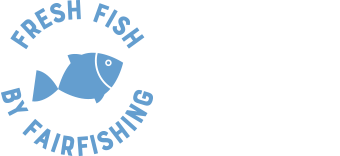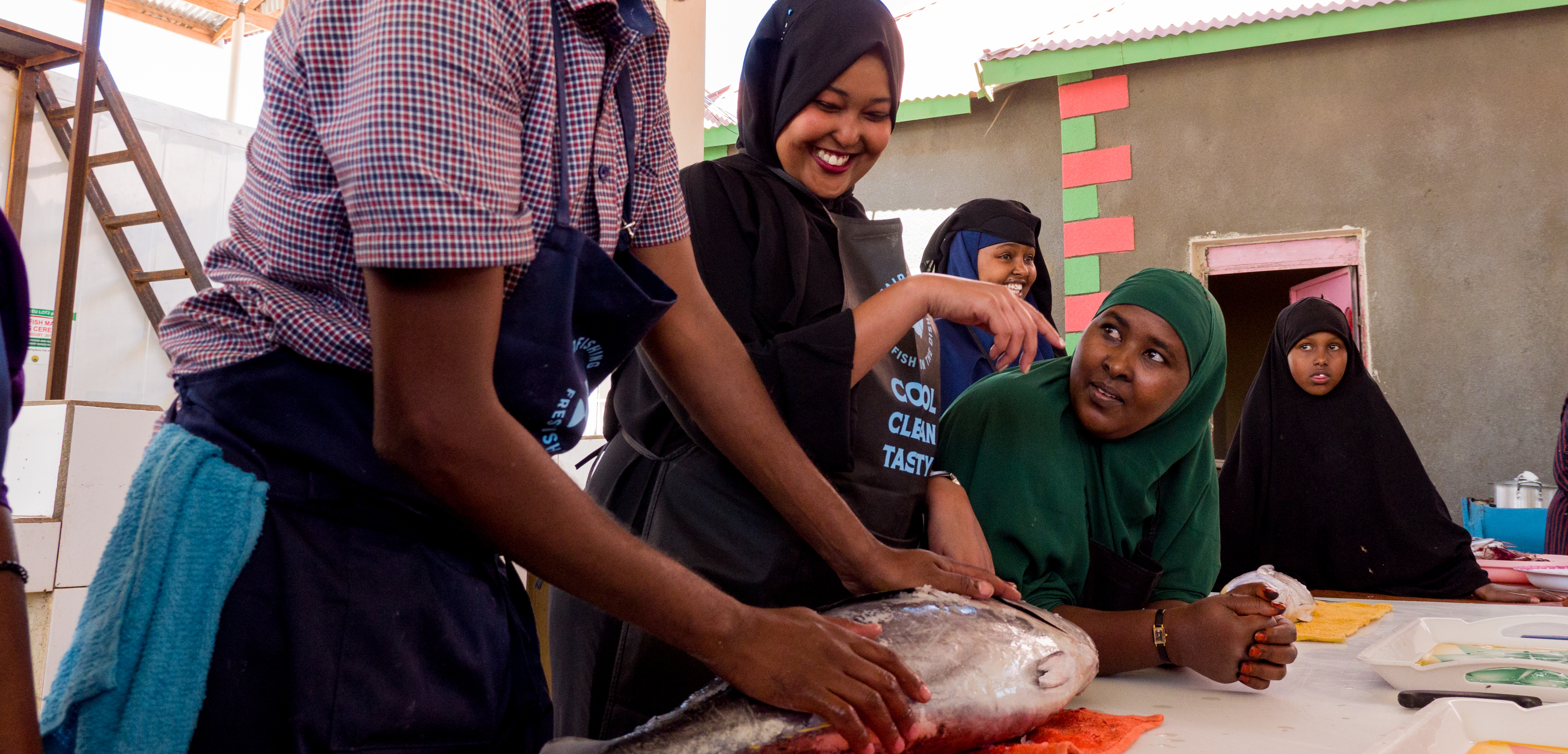New opportunities through fishery
/in Archive, News/by Annija BMeet Jama Yasin, he used to live in Oog, a small town in Sool region (located East of Burco) together with his family. Due to severe drought during 2017, a mayor part of the household’s livestock perished, compromising his livelihood and forcing him to migrate to the coast, with the aim of finding new livelihood opportunities.
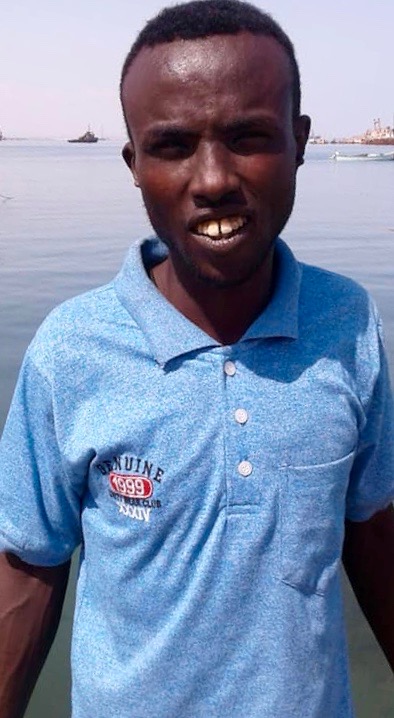
Fishery – a new livelihood strategy
In January 2018, Jama participated in the fishery technical training at sea, and it provided him with a wide range of new skills that opened up new job possibilities and diversifying his household’s livelihood strategies.
As a matter of fact, Jama is currently, October 2018, working on a small fishing boat owned by a businessman that operates in Berbera. He started working as a fisher, but he got promoted and is now the Skipper with a crew of three fishers on his command.
Normally they go fishing for three to four days per trip and mainly use drift nets, one of the fishing techniques learned during the training. On a trip like this they often catch approximately 1 tone that is directly sold in the harbour to distributers or mongers. The fishing trip therefore generates an approx. income of 1000 USD that is divided between the four members of the crew and the ship-owner.
Jama expressed his gratitude to FairFishing since the training at sea in Berbera provided him with useful skills, enabling him with the opportunity to get a job and income. At the same time, he diversified his livelihood strategies and now his entire household is more resilient to external threats as the drought that forced him to leave his home town.
Future perspectives
Jama looks at the future with an optimistic view, and he wants to keep develop his skills and continue in the fishing business. “I want to be the owner of a small boat and become a successful businessman in the future”, he told FairFishing staff in Berbera, September 2018.
Milestone: opening of three FairFishing facilities in Puntland
/in Archive, News/by Annija BOn the 25th of September 2018, a new fish market was opened in Galkayo, Puntland, with participation of local and national authorities, an EU delegation and the local community. The opening in Galkayo is the official launch of all three facilities opening in Puntland, where a market in Qardho and a station in Garacaad will open within the coming weeks. To open three new fishery facilities in Puntland is a great milestone in the program “Income, livelihood and nutrition through a fishery-based economy at the Horn of Africa”, funded by the EU and implemented by FairFishing in partnership with Ministry of Fisheries Puntland.
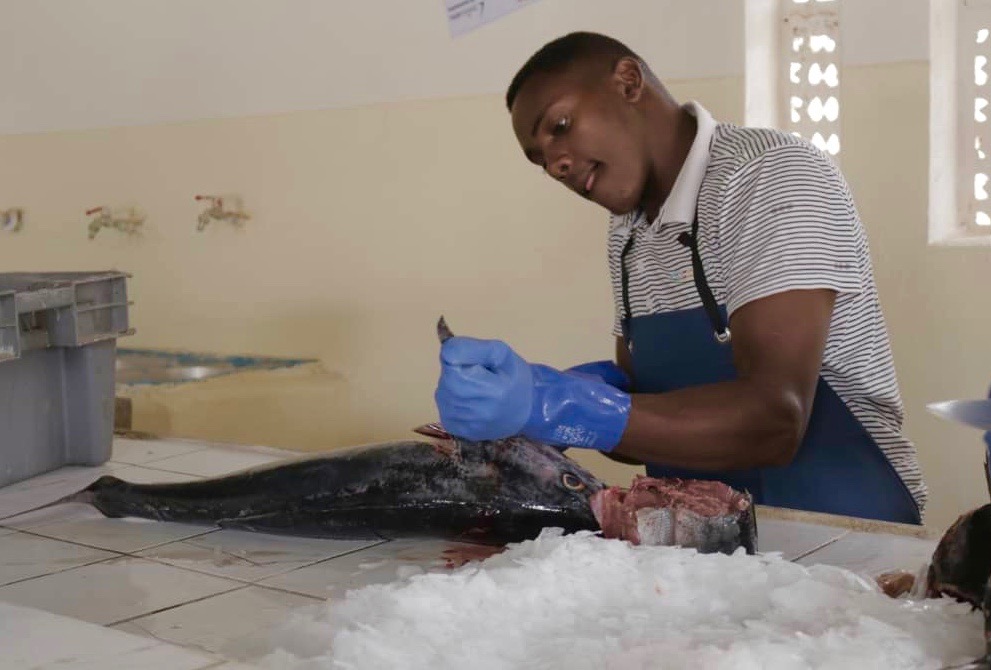
Galkayo is a town with high potential for an increasing consumption of fish. Therefore, a fish market was constructed by the local contractor Baca Construction and equipped with ice production, cold storage and market stands. At east from Galkayo at Puntland’s coast, a fishery station has been established in the fishery village Garacaad. The fishery activity has been low in Garacaad the last years due to lack of sufficient infrastructure, and this is something FairFishing and the EU aim to improve with the new station that will provide the community with affordable ice, cold storage, fishing gear and a reefer truck that can transport fish to markets such as Galkayo.
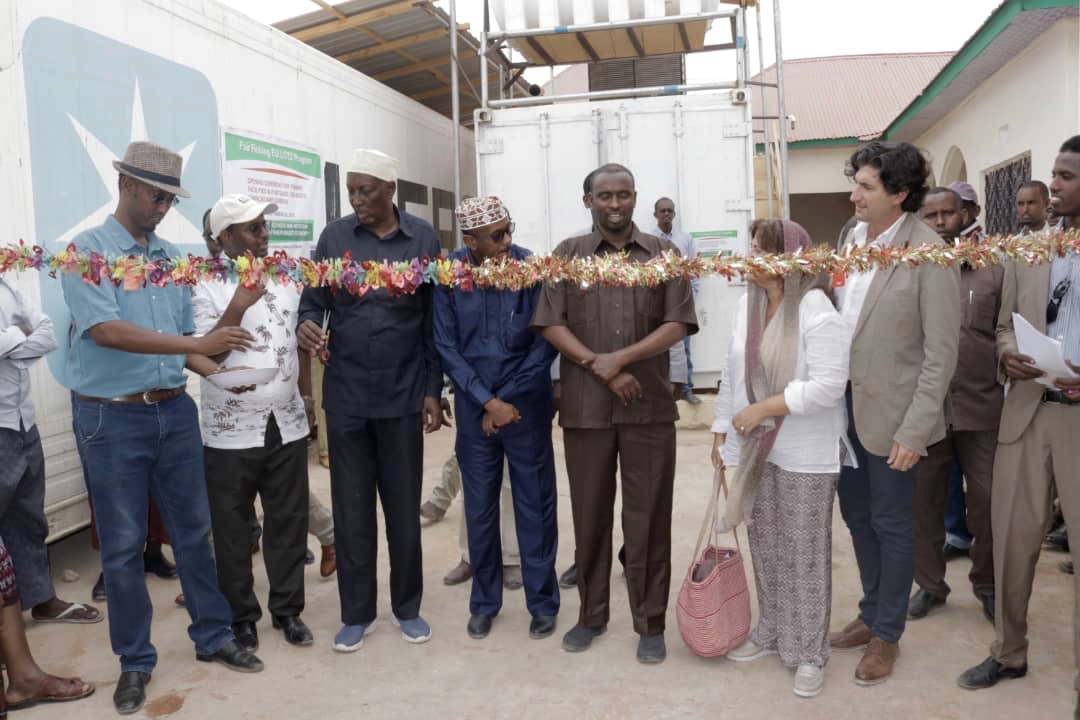
The last fishery facility opening in Puntland is a market in Qardho. Here, a compound with building has been rehabilitated to become a fish market where the local fishmongers and the community can purchase ice, store fish cold, as well as sell and purchase fish. By strengthening the whole fishery value chain from the coastal station in Garacaad to the two in-land markets in Qardho and Galkayo, the project aims to create job and income opportunities along the fishery value chain, as well as improve access to nutritious food among local populations.
An interview with a participant of our fishery training
/in Archive, News/by Annija BInterview with Abdi Fatah Mohamed Hasan, a participant in the first technical training at sea program in Berbera 2017/2018.
Abdi is 23 years old and lives in Berbera, where he is also born and has grown up. None of his parents has been working in fishery sector before, but some of his friends do. He was contacted by FairFishing LOT2 Fishery Expert Jama, who asked if he wanted to attend the new fishery training program that FairFishing was starting up in December 2017, and he was happy to agree.
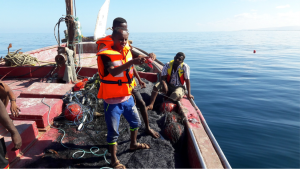 Practical fishery training at sea in Berbera, 2017
Practical fishery training at sea in Berbera, 2017
Experiences from the training program
Abdi explained that they had started the training program with one week on land, where they learned many different things that was important for the fishery, and it had all been new completely new to him. He had learned to swim, how to do first aid, different fish species and with what gear to catch them, as well as how to behave on a boat and, how to navigate it.
Reflecting back on what he had earned at sea, there were two things he would have liked to train and earn more about: Firstly, hygiene and fish handling and processing, and secondly, more technical training with different equipment at sea.
Abdi explained that the best thing about the training program had been, “when we one night caught and pulled up very big fish on the boat around midnight”. The toughest and most challenging experience had been, “to roll and unfold the nets after catches! And the vomiting at night… The first week all participants got sea sick and vomited at night, when it was all dark. First week we all vomited, but last week was totally ok”
Thoughts on the future
Abdi was completely new to fishery, before he attended the FairFishing training program. All components in the training had been new. Now, he states that he is very excited to continue in the fishery and would like to be a trainer himself one day. He feels that he is ready to go to sea and work now, even if there are things he can learn better and train more. Actually, he will start work with one of FairFishing’s partners now, called, Nec Fish. For the future he would like to be a captain, have his own business with several boats.
For the future work in the fishery sector, Abdi asked if there would be any further programs with more specified training that he could participate in, and if there was any possibility to get support with boats or business management from FairFishing. He mentioned that all participants enjoyed the program and wanted to continue in the fishery, but they still needed some support to create their own businesses.
To conclude the interview and his general experience of the training program, Abdi said that he had started out being afraid of the sea, but now he knows, how to swim very well and will even go swimming for fun sometimes.
(Berbera, Somaliland, 2nd of February 2018, by Malin Schmiedel)
Follow us on Facebook
/in Archive/by Michael BernthThe good news: We are busy building fishery in Somaliland, and it is more efficient with facebook-updates, because we can all share news there instantly, so that is where you can follow Somali Fair Fishing.
Gullestrup, Wang and Balslev-Olesen join Somali Fair Fishing
/in Archive/by Michael BernthFormer UNICEF boss Christian Balslev-Olesen, the Clipper Group partner whose hostage story became the basis for the film Kapringen, Per Gullestrup, and Rear Admiral in the Danish Navy, Nils Wang, join Somali Fair Fishing’s Board.
Saeed is struggling for a better catch
/in Archive/by Michael BernthDanish Somali Saeed Yusuf supports Somali Fair Fishing’s demo project in Somaliland: The fish and the will to find solutions are already there, but there is a strong need for a concerted effort to make commercial fishery a part of a growing economy.
A snowball in hell
/in Archive/by Michael BernthBy Kurt Bertelsen Christensen, fisherman and project manager
” I am sick and tired of all white people who only come here to photograph our fish and us”, the skipper says to his friends at the quay at the fishing port in Berbera in Somaliland.
Fisherman Kurt goes to Somaliland
/in Archive/by Michael BernthKurt Bertelsen Christensen, a Danish fisherman with vast experience building sustainable fishery in Eritrea, Kenya and in the Aral Lake, officially signed on as project manager for our 2012-2014 demo project on September 1.
The plan: 2 years, 15 vessels, 75 fishermen, 400 tonnes of fish
/in Archive/by Michael BernthSomali Fair Fishing is ready to embark on its very first pragmatic and hands on demonstration project: We will train 75 new Somaliland fishermen on 15 vessels to catch 400 tonnes of fish in 2013-2014 – proceeding to replicate and scale the fishery to cater to other areas and markets in the years to come.
